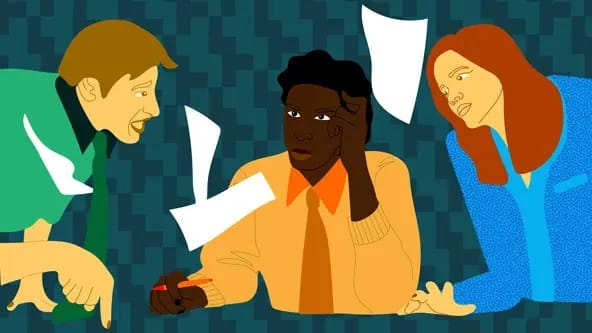- The Corporate Cheat Code
- Posts
- “Professionalism” Is Code for Assimilation
“Professionalism” Is Code for Assimilation
If you have to shrink, straighten, quiet, or code-switch to be seen as “professional”... it’s not professionalism - it’s control.

Let’s Get Real About What “Professionalism” Actually Means
“Professionalism” sounds neutral. But it’s anything but.
It’s often just a socially acceptable way to say:
“Act like the dominant group. Or you won’t belong here.”
It’s used to police tone, appearance, language, and behavior - especially for women, people of color, LGBTQ+ folks, neurodivergent professionals, and first-gen employees.
It’s not about excellence. It’s about sameness.
Your Hair Is Not Unprofessional
If you’ve ever been told to “tame” your curls, or that locs, afros, braids, or twists are “not appropriate for the workplace,” you already know:
Professionalism has a race problem.
When straight hair is the standard and everything else is a “distraction,” that’s not policy, it’s bias wrapped in HR language.
We shouldn't have to choose between showing up authentically and being taken seriously.
“Watch Your Tone” Is Code for “Be Less You”
Let’s talk tone-policing.
Black women get labeled “aggressive” for expressing confidence.
Professionals from other marginalized communities are called “emotional” for showing passion.
Women in general are told to “smile more” or “soften” their feedback.
Meanwhile, the same behavior in white male colleagues is called “direct” or “strategic.”
It’s not about tone. It’s about who’s allowed to have one.
Dress Codes That Erase Identity
“Neutral,” “clean,” “polished.”
These dress code buzzwords? Often just another way to say “Don’t look too ethnic. Don’t be too different.”
Traditional corporate dress codes are often based on white, Western, binary standards of gender and class.
If what you wear to honor your culture or identity is labeled unprofessional, the problem isn’t your outfit - it’s the system’s comfort zone.
Code-Switching as Survival
Early in my career, I’d second-guess every word before speaking - making sure I didn’t sound “too assertive” in meetings.
I’d overthink my emails, adding exclamation points and smiley faces to soften my tone. I wore neutral colors, kept my hair straight, and avoided bringing up anything that hinted at where I was really from.
Like so many others, I showed up each day as a curated version of myself, one I thought would be more “acceptable.”
It’s exhausting. It’s unsustainable. And worst of all - it’s expected.
Being forced to dilute your identity in order to be promoted, respected, or even just left alone isn’t professionalism.
It’s assimilation under pressure.
Neurodivergence and the Myth of the “Perfect Communicator”
If you don’t make eye contact, if you pause before responding, if you communicate differently - corporate culture may label you as “awkward,” “poor fit,” or “unprofessional.”
Neurodivergent folks are constantly evaluated against norms that were never built with them in mind.
Professionalism shouldn’t punish people for not presenting like a TED Talk speaker.
It’s Time to Redefine Professionalism
What if professionalism wasn’t about performance?
What if it was about:
✅ Respect
✅ Integrity
✅ Accountability
✅ Cultural awareness
✅ Clear communication
✅ Boundaries
We don’t need to lower standards. We need to expand them.
Professionalism should reflect excellence, not erasure.
TL;DR:
If the definition of professionalism excludes authenticity, it’s not professionalism - it’s oppression in a blazer.
Let’s stop telling people to “fit in” and start building workplaces where people can belong.
Reply